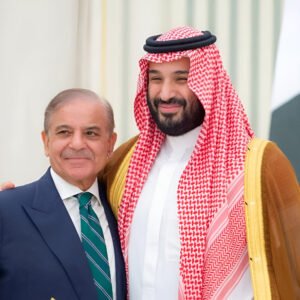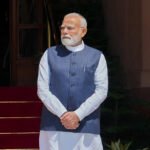Prime Minister Narendra Modi on August 26, 2025, flagged off Maruti Suzuki’s first global battery-electric vehicle—the e-VITARA—at the company’s Hansalpur plant in Gujarat, announcing that the model will be manufactured in India and exported to more than 100 countries.
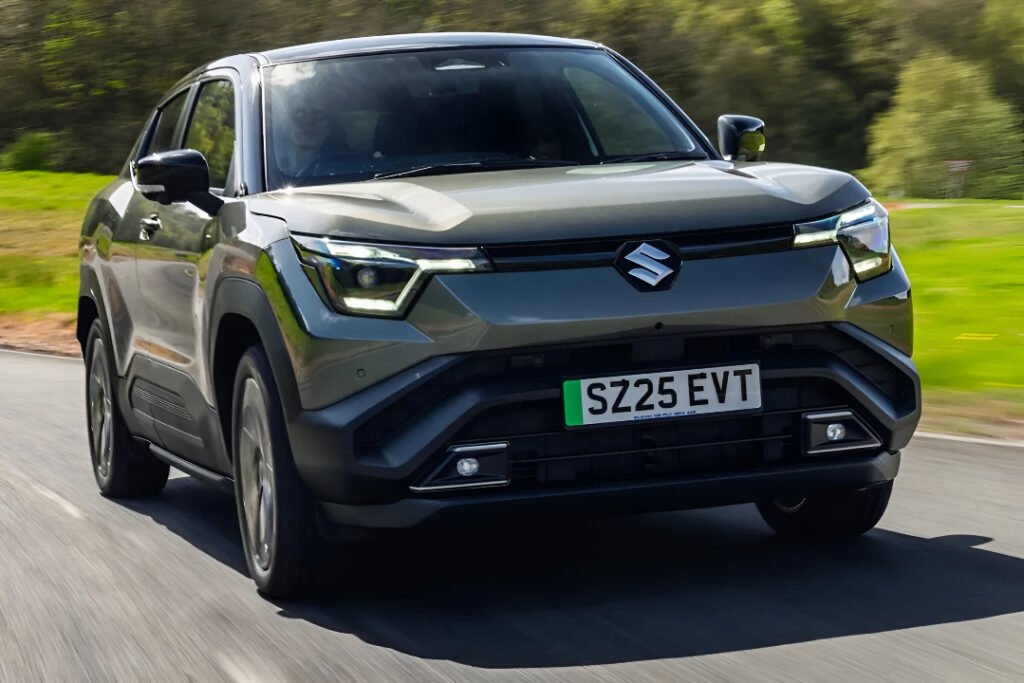
The e-VITARA launch combines vehicle production with domestic battery manufacturing and a major fresh investment pledge from Suzuki, signaling India’s push to become a global EV manufacturing hub. For policymakers, OEMs, and supply-chain players, the event marks a step-change in localization, export strategy, and the national “Make in India, Make for the World” narrative.
What Modi unveiled
At the Hansalpur ceremony the Prime Minister formally flagged off the e-VITARA—described by officials as Suzuki’s first “Made-in-India global strategic BEV”—and inaugurated the next phase of local battery-electrode production under a TDS (Toshiba–Denso–Suzuki) joint initiative. Modi framed the moment as a leap for India’s green mobility ecosystem and underlined ties with Japan as the model goes from India back to global markets.
Project specifics and key numbers
- Exports: e-VITARA to be exported to 100+ countries, including advanced markets such as Japan and parts of Europe.
- Investment: Suzuki Motor Corporation announced a ~₹70,000 crore (≈$8 billion) expansion plan in India over the next 5–6 years tied to EV capacity and localization.
- Capacity & battery value-add: The Gujarat complex is being positioned as a global hub, with battery electrode production expected to ensure >80% battery value is localized via the TDS joint venture. Maruti Suzuki plans multiple BEV launches through FY31.
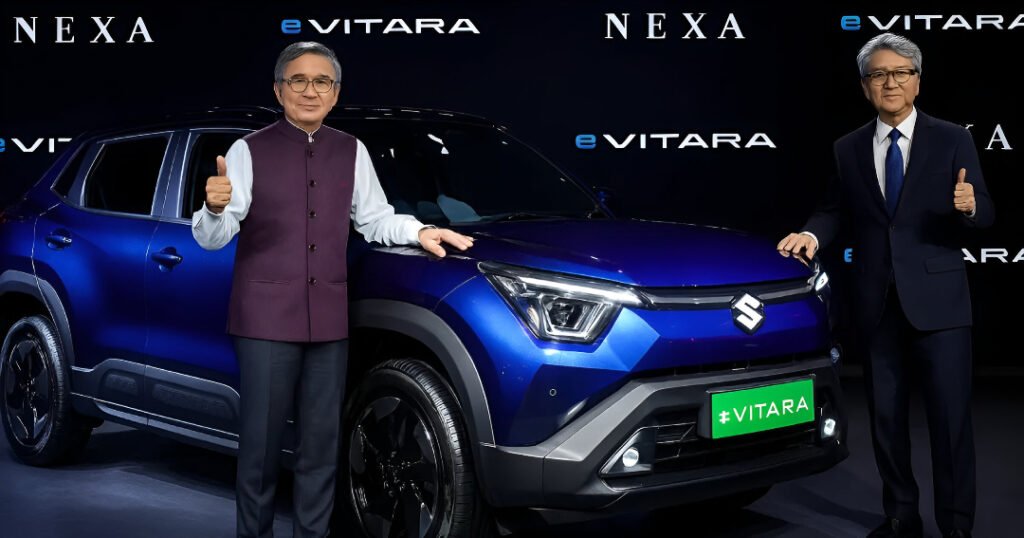
Economic and industrial impact
The e-VITARA program is a composite industrial play: vehicle assembly, local battery-electrode production, and supplier scale-up. Officials argue this will shrink import dependence for battery components, expand high-skill manufacturing jobs in Gujarat, and improve export earnings. Analysts say setting India as a production base for Suzuki’s global BEV line could catalyze supplier investment, logistics improvements, and downstream services in the state.
Reactions and key quotes
Modi used succinct branding to pitch the milestone: “The world will drive EVs that say… Made in India!” and reiterated “Make in India, Make for the World.” Suzuki’s leadership framed the initiative as part of an ambitious roadmap to defend market share and convert India into Suzuki’s EV production hub. Independent outlets noted the company’s targeting of mid-sized SUV segments where export demand is robust.
Timeline & background
The Hansalpur site—part of Maruti Suzuki’s long-term footprint in Gujarat—has been in development for several years. The TDS battery plant foundation traces to earlier 2017 planning; the current phase bundles cell-component localization (electrodes) with vehicle roll-out, a strategy designed to meet global homologation and supply-chain resilience needs. Suzuki says commercial e-VITARA production has now begun, with progressive ramping to follow.
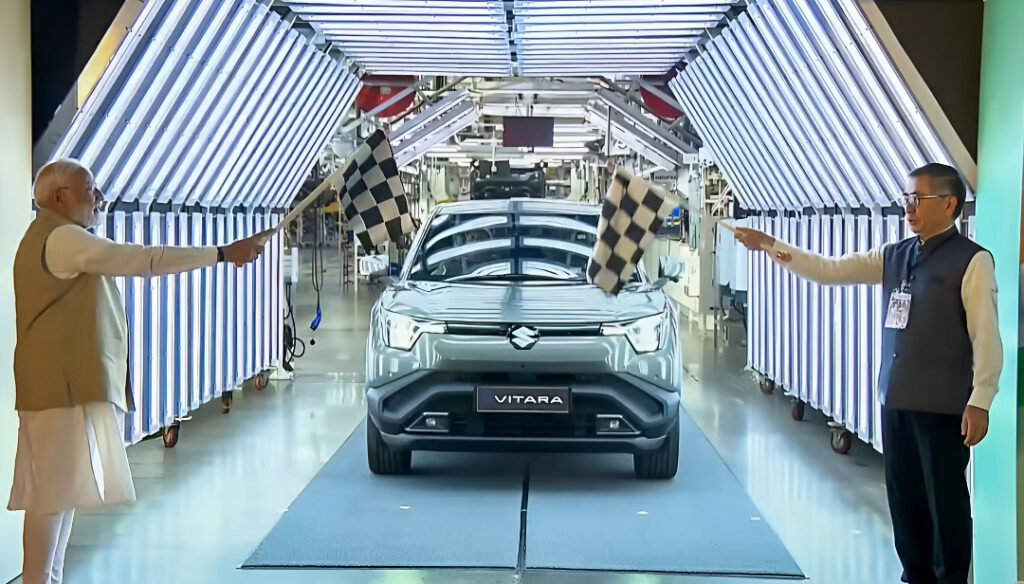
What’s next?
- Production ramp: Expect stepwise capacity increases and serial production targets as plant commissioning continues; official timelines tie into Suzuki’s FY31 BEV roadmap.
- Exports & certifications: Getting vehicles certified for multiple regulatory regimes (Japan, EU) and coordinating logistics for exports will be immediate priorities.
- Supply-chain scaling: Broader localization of battery cells and critical components remains a watch area; India’s National Critical Mineral Mission and incentives could shape sourcing strategies.
According to the Press Information Bureau release covering the Hansalpur ceremony and government statements on the e-VITARA and battery initiatives. Additional reporting and investment details are drawn from Reuters and Economic Times coverage of Suzuki’s investment and export plans.
Conclusion
The e-VITARA unveiling is more than a product launch—it is a test of India’s ability to knit vehicle manufacturing, battery localization, and export logistics into a competitive global proposition. If Suzuki’s Gujarat hub scales as promised, India could gain a strategic foothold in the global EV value chain: higher exports, deeper localization, and new industrial jobs. The proof will be in certification, sustained production ramp-up, and whether ancillary suppliers and battery cell production meet the timeline—benchmarks that will determine whether “Made in India, Made for the World” moves from slogan to sustained industrial reality.


